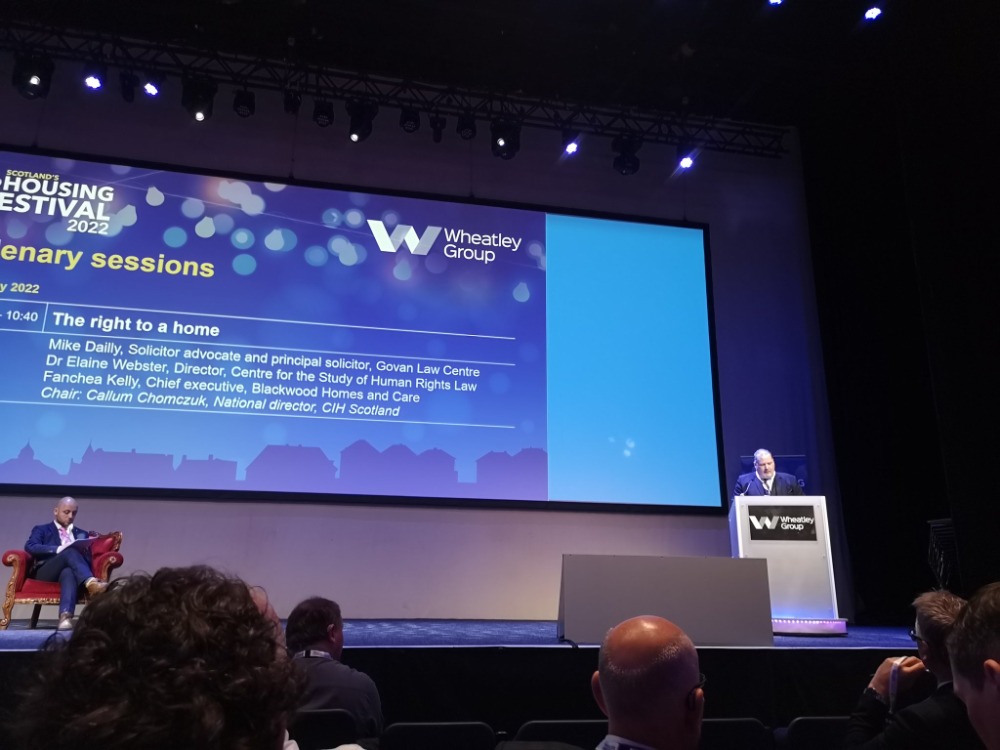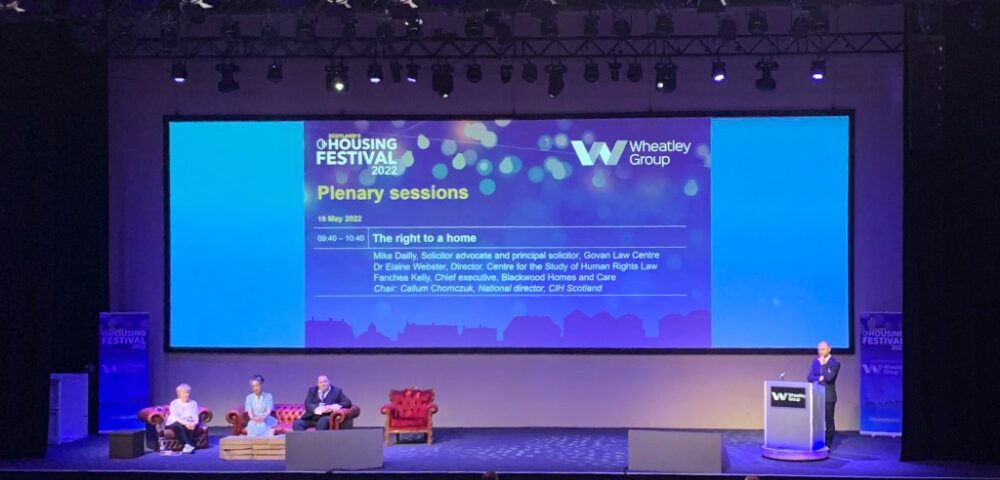
Mike Dailly, GLC solicitor advocate, keynote speech at Chartered Institute’s Scottish Housing Festival. Mike called for people to be able to enforce their housing rights, more homes and better appropriate temporary accommodation. Read the full speech below:
The right to a home?
Scotland has some of the most progressive housing law rights – particularly in the field of homelessness – in the world.
But rights are meaningless unless you can access and enforce them.
Thereafter, your system of local government and social housing has to have the physical infrastructure and public funding to realise those rights.
Let’s consider the evidence in Scotland.
We had 13,192 households with 7,510 children in temporary homeless accommodation as at the end of last September.
Our 32 local authorities had 26,000 open homeless cases across the country. You don’t have to be John Maynard Keynes to realise that we have a supply-side housing problem.
Over the last couple of decades, the failure of our housing policy has been to believe the private sector can solve this problem.
Over the last 22 months in Glasgow we’ve paid £17m to private B&Bs to accommodate homeless people. Far more is spent in Edinburgh. We use B&Bs to house vulnerable and traumatised people.
Why do we do that? Why have we never built proper emergency temporary accommodation in the public or housing association sector?
In my experience as a housing lawyer for almost 30 years, the private sector is ill-equipped to provide the kind of support that vulnerable people need – whether in terms of mental or physical health, addiction, or trauma support.
Using B&B’s is worse than our old system of hostels. We abolished hostels – well some of them – as they were Dickensian and squalid – yet, B&Bs and homeless hotels are no better.
It’s not unusual for many homeless households to remain in temporary accommodation for years – typically if they have children. Turnover and resettlement are faster for single person households, who tend to be men.
How does that square with the right to a permanent home and tenancy in law?
Being stuck in temporary accommodation is an existence of limbo. As temporary accommodation rents aren’t subsidised, and local authorities have a discretion to pursue full cost recovery, rents can be very high.
This means if you lose your housing benefit because you start a new job or go into further education, youend up with rent arrears and personal debt. While that’s a pernicious outcome, much worse is the fate of people being placed in unsuitable temporary accommodation for indefinite periods.
It used to be the case there was no right to any standards when it came to temporary homeless accommodation: you took what was offered and had to be grateful for small mercies. Yet we made progress with the 2004 Unsuitable Accommodation Order.
The 2004 Order was modest and only applied to homeless applicants who were pregnant or had a dependent child – however it was beefed up in 2014, 2019, 2020 and 2021 and became the 2014 Order. From May 2020, it was extended to all homeless persons.
Three weeks ago, the Court of Session – Scotland’s highest civil court – held that local authorities were under an absolute legal obligation to provide accommodation suitable for occupation by a homeless household, taking into account the needs of a household.
This week in X v. Glasgow City Council the court granted final decree including declarators that the council had acted unlawfully and ultra vires of the 2014 Order; that its failure to make reasonable adjustments to provide the petitioner with suitable temporary accommodation was ultra vires of section 29 of the 1987 Housing (Scotland) Act 1987 when read with sections 20 and 29 of the 2010 Equality Act.
An order for specific performance was granted for the council to provide suitable accommodation conform to the 2014 Order no later than 30 September 2022.
Glasgow City Council had argued they had a legal discretion to balance the needs of a homeless household against other demands on their finite resources. In essence, a council could provide legally unsuitable accommodation indefinitely. The court did not agree.
I presume Glasgow will still be arguing this line of defence in the coming months, as their senior counsel advised the court this week he was instructed to reclaim – appeal – to the Inner House.
The case of X illustrates that even where rights are enforced – they are resisted because the thought of implementing them for everyone terrifies local authorities.
I’m not allocating blame here – local government has been systematically underfunded year on year – this is equally the responsibility of government and our Parliament in Holyrood. If you create rights for people, they need to be properly resourced and funded.
If we are serious about social justice and treating human beings with dignity in Scotland it cannot be beyond the wit of our political leaders to think more creatively.
We can use taxpayer’s money to provide high quality emergency accommodation. That can be done either by the council itself, housing associations or charities.
We have a Scottish National Bank, why don’t we use that to build more new properties and source the capital? – the income stream from housing benefit will cover temporary accommodation and rents would cover permanent homes.
Mike Dailly, GLC solicitor advocate

Why do we have a poverty of ambition and apathy for innovation?
In the last decade, the number of children living in severe poverty in the private rented sector doubled to 50,000. Scotland has around 340,000 households in the PRS.
Rent affordability continues to get worse year on year. The poorest 10% of people in our society who live in the PRS spend 57% of their income on housing costs. With inflation now soaring this can only get worse.
I believe the PRS is a dysfunctional market that’s trebled in size over the last 20 years. The sector’s growth has exploited a lack of social housing. We all need somewhere to live, and the market has overheated in many parts of Scotland because there’s no alternative for those with modest or low incomes.
We need to do two things. First, introduce an emergency rent freeze for a set period in the PRS given the cost of living crisis. Second, expand our building programme for public and social housingwith guarantees to safeguard the existing assets of social landlords in taking on such projects.
Returning to Keynesian economics, if we increase the supply-side of social housing the demand for private rented accommodation will reduce as would out-of-control rents. If we did that, the legal right to a proper home would become a reality for thousands of households.
